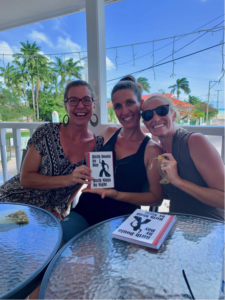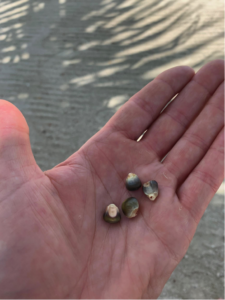“The only reason the birthing person needs someone in the room is so if something goes wrong, they know it was the mother’s fault.”
– Nurse in Belize
 Sitting here on a white sand beach overlooking the turquoise Caribbean Sea, I am winding up my last day on Caye Caulker Island in Belize. I came down on the request to lead a birth doula training with only the knowledge that birth was nothing like I have experienced.
Sitting here on a white sand beach overlooking the turquoise Caribbean Sea, I am winding up my last day on Caye Caulker Island in Belize. I came down on the request to lead a birth doula training with only the knowledge that birth was nothing like I have experienced.
All across the island I have asked many questions about access to health and care, births and babies, parenting and family structure. What I found out was so different from what we experience here at home in the United States and yet there are so many things that are the same.
Most native Belizeans only have access public hospitals unless you are privileged and can pay for the private ones. In a public hospital four to six women labor at a time in a room separated by curtains. Only in 2008 did they pass a law/policy saying that the laboring mother can have a support partner with her during labor. And if you do have a support partner with you they can be asked to leave. Most mothers do not have the father of the baby with them as there is no education and they see birth as women’s work. The men are not generally supportive and helpful in the laboring. Most mothers will choose to have a female family member with them.
The country requires your first baby to be born in the hospital. You are not allowed to give birth outside a hospital so woman living in rural areas have to travel sometimes far distances to access the public hospital. However, there are clinics for prenatal care located in the different villages and islands.
Access to Pain Medication
Access to pain medication in the public hospital is none unless you are having a cesarean (they call it “getting cut.”) So most women have no epidurals or pain medications during labor in the public hospital and they are not readily available even in the private hospitals. Epidurals are not used in the country, only spinals for cesareans. But the biggest thing I learned is that clinicians do not even use lidocaine when a woman has a repair after the birth and everybody generally does with the episiotomy rate being 90%. This means that women’s perineums are stitched without numbing medication.
For the Record…or Lack Thereof
Statistics are hard to find for the country, with them only going online to their department of health several years ago. And even then there’s no access to infant or maternal outcomes. It seems like the cesarean birth rate in the private hospitals runs about 70% (no data for public hospitals but the rate is much less because cesareans are expensive) with the reasons being diagnosed on ultrasound. Some of the reasons can be the baby’s hand is up by their face, the cord is around the baby’s neck, the baby has not dropped because cord is wrapped around the neck and of course the baby is too big.
Trauma Runs Deep
But what I do know is that trauma runs deep here. Doctors give no choices just orders and nurses are extremely abusive.
The nurses are known throughout the country of being scary, mean and abusive. They slap mothers when they don’t listen, yell, scold and berate patients when they feel like they have done wrong One of my participants in the doula training said a nurse grabbed and held her so hard she had bruises for weeks afterwards. If the nurses don’t physically abuse, they verbally berate and abuse. One story here was of a woman who was making too much noise so they locked her in a room during labor until she would be quiet.
But I think the most impactful realization in my time here was that in many places in the United States it is not that much different. The only difference is that we wrap things up with a shiny bow so people don’t quite know that the abuse is happening. Colonization and internalized oppression are the world’s story not just Belize’s and our birth and maternal outcomes in the United States reflect that.
Myself, I would rather have the bruises, the actual physical trauma, something that I can see to remind myself that I am not crazy and I have the physical proof. But it’s the slippery slope of the invisible oppression that’s the hardest to pin down. It’s the underlying systemic racism that is the most challenging. This is where the bruises are not seen on the physical body because they’re on the soul.
Prisoner of HOPE
But through all of this, I am a prisoner of hope! There is a small but passionate and dedicated group of mothers, midwives and women who are committed to building relationships and letting people know things can be different. And together we spent three days unpacking the history of colonialism, internalized oppression, and power which becomes the norm for how way we bring our babies in to the world. We met with a midwife of 30 years of experience from Texas who attends births throughout the country and spoke to the foundation of education as the key to unlock potential, building trust in relationships with members of the community, bringing a level of body literacy for women and lifting up the power of choice.
Where Do We Go From Here?
 So where do we go from here? Keep building relationships, asking questions, indentifying community leaders and being curious about what the community sees as important. As many of you know, I am wildly passionate about education as the key to unlock so much potential and change. So in this vein, I have been asked back to bring a childbirth educator training to the country. I am also going to start a program that will sponsor a childbirth educator with supplies so many communities across the country will have access to an educational component.
So where do we go from here? Keep building relationships, asking questions, indentifying community leaders and being curious about what the community sees as important. As many of you know, I am wildly passionate about education as the key to unlock so much potential and change. So in this vein, I have been asked back to bring a childbirth educator training to the country. I am also going to start a program that will sponsor a childbirth educator with supplies so many communities across the country will have access to an educational component.
Over the past ten years, in each of my trainings, I have passed on the blessings of dry corn. And in these blessings, I always remember that change begins on the bottom with growing deep grassroots movements rich with self care and community. This organizing motivates the middle and ultimately creates change at the top. I deeply believe women and families deserve better at all times but especially when they bring life into the world and I have dedicated my life to being a better ancestor for the generations to come.


